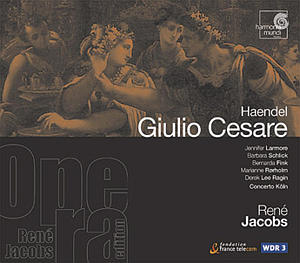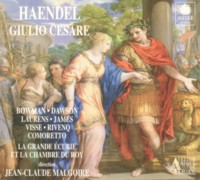The release of the new recording of Giulio Cesare in Egitto under Marc Minkowsi is the occasion to look back quickly to the two most striking previous publications of that opera, both released in the 1990’s. Though one of these recordings is much more famous than the other, they are both still worth hearing despite being quite different.
 |
 |
|
Jennifer Larmore |
Cesare |
James Bowman |
|
Barbara Schlick |
Cleopatra |
Lynne Dawson |
|
Derek Lee Ragin |
Tolomeo |
Dominique Visse |
|
Marianne Rorholm |
Sesto |
Erian James |
|
Bernarda Fink |
Cornelia |
Guillemette Laurens |
|
Furio Zanasi |
Achilla |
Nicolas RIvenq |
|
Dominique Visse |
Nireno |
Jean-Louis Comoretto |
|
Olivier Lallouette |
Curio |
|
|
Concerto
Köln |
Orchestra |
La Grande
Écurie et la Chambre du Roy |
|
René Jacobs |
Conductor |
Jean-Claude Malgoire |
|
Harmonia Mundi |
Label |
Astrée Auvidis |
|
3 + 1 |
CD |
3 |
|
HMC 901385.87 / HMX 2901385.87 |
Catalogue Number |
E 8558 |
|
1991 |
Recording Year |
1995 |
|
1991 / 2003 |
Release Year |
1995 |
The release of René Jacobs’s recording of Giulio Cesare was a big event in 1991, and it is true that this production is of a very high standard. Concerto Köln’s playing is of an accuracy and virtuosity which are not really found in La Grande Écurie et la Chambre du Roy’s playing. Jacobs conducts a very demonstrative and impressive performance of Giulio Cesare, not devoid of emotion but sometimes lacking some of the poetry which is present in Jean-Claude Malgoire’s version. Malgoire’s tempos seem sometimes slightly slow, but the whole works because his intimate approach is totally coherent.
The performances of the singers more or less follow those general feelings. The American mezzo-soprano Jennifer Larmore is an impressive Cesare, showing great singing and a totally convincing embodiment of the Roman hero. The English countertenor James Bowman is much less impressive from a vocal point of view, but his musicality and personality result in an amorous Cesare full of charms – see “Se in fiorito ameno prato” (“If, in the pleasant, flowery meadow”), Act II scene 2, a summit of elegance and delicacy.
As Cleopatra, Barbara Schlick’s performance always sounds good though not exceptional, but a comparison with Lynne Dawson is definitely to the advantage of the latter in every respect. Her dark soprano is of rare charm and emotion, and a sort of fragility that is sometimes part of her singing is just a pure delight. Dawson is one of the best Cleopatras ever heard.
Tolomeo is presented in two very different kinds of character. Derek Lee Ragin is excellent and his vocal performance, full of virtuosity and playing with the registers in a way quite rare in its vocal category, is maybe one of the best evocations of castrato singing among countertenors nowadays. Dominique Visse hasn’t got the same powers – his voice could not please everybody – and is more reputed as Nireno, but thanks to his involvement, he is offering a convincing characterization of what is finally just a teenager torn between the caprices of his childhood and the privileges of adulthood and of his social status.
There is very little reproach for the small parts, and the two Sestos and Cornelias have excellent interpreters with the ideal Eirian James, Marianne Rorholm, a perfectly casted Guillemette Laurens, and Bernarda Fink – who sings a very beautiful and slow “Priva son d’ogni conforto” (“Bereft of all comfort”, act I scene 4).
Note that Jacobs’s recording is on four CDs and has Nireno’s aira “Qui perde un momento”. Anyway both recordings are interesting and have beautiful moments not to miss, thus it is particularly difficult to choose one of them. But have we really to do without one of those pleasures, all the more because Minkowski’s brand new version has not necessarily offered the expected alternative?
Jacobs: |
 |
Malgoire: |
 |